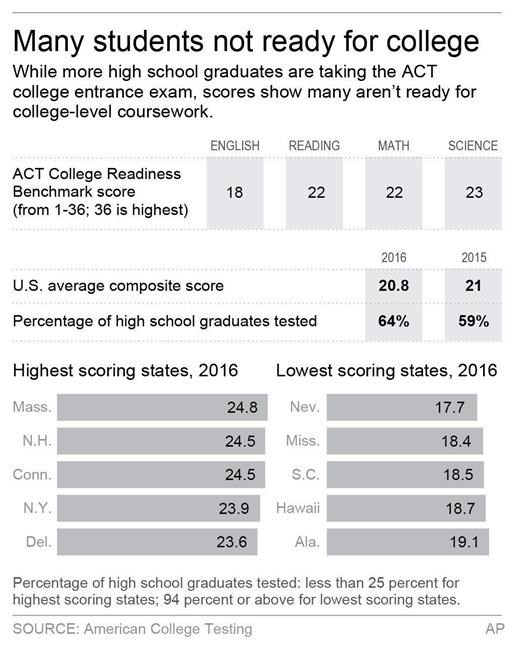Elevate your local knowledge
Sign up for the iNFOnews newsletter today!
Sign up for the iNFOnews newsletter today!
Selecting your primary region ensures you get the stories that matter to you first.

WASHINGTON – Nearly two-thirds of this year’s high school graduates took the ACT college entrance exam, and their scores suggest that many remain unprepared for the rigours of college-level coursework.
The testing company said Wednesday that only 38 per cent of graduating seniors who took the exam hit the college-prepared benchmark in at least three of the four core subjects tested — reading, English, math and science — down from 40 per cent last year. The benchmark is designed to measure a strong readiness for college.
The average composite score also declined a bit, down from 21 to 20.8 this year. The four tests are scored on a scale of 1 to 36. The composite is the average of the four scores. The vast majority of colleges use the composite in admissions.
ACT’s Paul Weeks says a decline in scores was expected, given the changing demographic of the testing population.
“Almost 2 out 3 students are taking the ACT and what’s happened is the testing cohort has become increasingly representative of students at large,” said Weeks, senior vice-president for client relations, in an interview.
A number of additional states also are giving the ACT to all of their 11th-grade students. “That group of new states showed up in this year’s grad class report so we would have expected it to have an impact” on scores, Weeks said.
Nearly 2.1 million graduating seniors took the ACT, up from 1.9 million in the last school year.
By comparison, 1.7 million graduating seniors in 2015 took the SAT, the other major college entrance exam. The College Board expects to release updated 2016 numbers for the SAT later this fall.
Of the ACT-tested high school graduates this year, 61 per cent met the English benchmark of 18 points, which indicates a student is likely ready for a college composition course and would earn a “C” or better grade.
In reading, 44 per cent met the 22-point mark that suggests readiness for a college-level social-sciences course. For math, 41 per cent met the 22-point threshold that predicts success in an algebra course. And in science, 36 per cent hit the 22-point score that predicts success in an entry-level biology course.
In contrast, 34 per cent of 2016 grads did not meet any of the four benchmarks. Weeks called that number alarming, an indication that those students are likely to struggle with first-year courses and end up in remedial classes that will delay degree completion and increase college costs.
The report showed a relatively wide gulf, by race, in the percentages of graduates hitting three or more of the college-ready benchmarks. Forty-nine per cent of white test-takers met the three-or-more benchmark, compared to 11 per cent of African Americans and 23 per cent of Hispanic test-takers. But the gaps between the groups haven’t shifted that much, for better or worse, in the last four years.
When students register for the ACT, they can designate a college major. For 2016 grads, the most popular major selected was nursing, followed by pre-medicine, business administration and management and mechanical engineering.
Other findings in the annual score report:
—Massachusetts had the highest average composite score, at 24.8. It was followed by Connecticut and New Hampshire, both with a 24.5 average composite score.
—In the last four years, the proportion of students saying they would like to pursue vocational/technical and two-year degrees increased by 2 per cent. The proportion aspiring to higher levels of education dropped by 6 per cent.
The testing company says 20 states funded ACT testing for all public school students in the 2016 graduating class. Those states are: Alabama, Alaska, Colorado, Hawaii, Illinois, Kentucky, Louisiana, Michigan, Minnesota, Mississippi, Missouri, Montana, Nevada, North Carolina, North Dakota, South Carolina, Tennessee, Utah, Wisconsin and Wyoming.
This site is protected by reCAPTCHA and the Google Privacy Policy and Terms of Service apply.
Want to share your thoughts, add context, or connect with others in your community?
You must be logged in to post a comment.